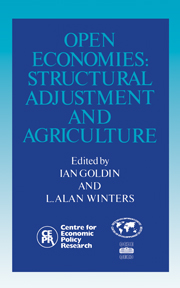Book contents
- Frontmatter
- Contents
- List of figures
- List of tables
- Preface
- Acknowledgements
- List of conference participants
- 1 Introduction: from macro to maize
- Part One Open economy analysis
- 2 Sequencing and welfare: labour markets and agriculture
- Discussion
- 3 Agricultural adjustment and the Mexico-USA free trade agreement
- Discussion
- 4 Do the benefits of fixed exchange rates outweigh their costs? The CFA Zone in Africa
- Discussion
- 5 Adjustment and the rural sector: a counterfactual analysis of Morocco
- Discussion
- Part Two The small country assumption and trade reform
- Part Three Risk and adjustment
- Part Four Government's role
- Index
4 - Do the benefits of fixed exchange rates outweigh their costs? The CFA Zone in Africa
from Part One - Open economy analysis
Published online by Cambridge University Press: 04 August 2010
- Frontmatter
- Contents
- List of figures
- List of tables
- Preface
- Acknowledgements
- List of conference participants
- 1 Introduction: from macro to maize
- Part One Open economy analysis
- 2 Sequencing and welfare: labour markets and agriculture
- Discussion
- 3 Agricultural adjustment and the Mexico-USA free trade agreement
- Discussion
- 4 Do the benefits of fixed exchange rates outweigh their costs? The CFA Zone in Africa
- Discussion
- 5 Adjustment and the rural sector: a counterfactual analysis of Morocco
- Discussion
- Part Two The small country assumption and trade reform
- Part Three Risk and adjustment
- Part Four Government's role
- Index
Summary
A primary reason for structural adjustment in agriculture is the wide fluctuation in the world prices of agricultural commodities, which causes sharp swings in the terms of trade of countries that rely on these commodities for their export earnings. A key instrument in structural adjustment is the exchange rate. How, and whether, this instrument is used, however, depends on the ‘rules of the game’ – that is, the particular exchange rate regime the country is in. This paper addresses the question of how small, open economies that are subject to sharp swings in their terms of trade should select an appropriate exchange rate regime. We develop a framework to clarify the trade-offs involved, and apply it to the CFA Zone countries in Africa, which have maintained a fixed parity with the French franc since independence.
Thanks to the predominance of a few agricultural products and natural resources in their exports, CFA member countries have suffered frequent shocks in their terms of trade. A flexible exchange rate could have possibly alleviated some of the output costs of these external shocks. On the other hand, a fixed exchange rate has enabled these countries to maintain lower inflation levels than their neighbours. Our framework provides a way of weighing these costs and benefits. Using our model as a guide, we investigate whether their choice of a fixed exchange rate was (and remains) a wise one.
- Type
- Chapter
- Information
- Open EconomiesStructural Adjustment and Agriculture, pp. 66 - 85Publisher: Cambridge University PressPrint publication year: 1992
- 6
- Cited by



